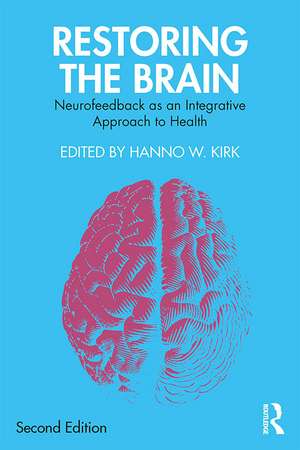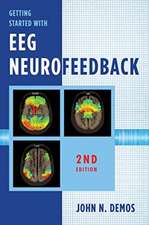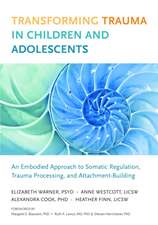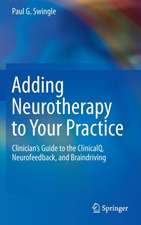Restoring the Brain: Neurofeedback as an Integrative Approach to Health
Editat de Hanno W. Kirken Limba Engleză Paperback – 4 mar 2020
This thoroughly updated second edition of Restoring the Brain is the definitive book on the theory and the practice of Infra-Low Frequency brain training. It provides a comprehensive look at the process of neurofeedback within the emerging field of neuromodulation and essential knowledge of functional neuroanatomy and neural dynamics to successfully restore brain function.
Integrating the latest research, this thoroughly revised edition focuses on current innovations in mechanisms-based training that are scalable and can be deployed at any stage of human development. Included in this edition are new chapters on clinical data and case studies for new applications; using neurofeedback for early childhood developmental disorders; integrating neurofeedback with psychotherapy; the impact of low-frequency neurofeedback on depression; the issue of trauma from war or abuse; and physical damage to the brain.
Practitioners and researchers in psychiatry, medicine, and behavioral health will gain a wealth of knowledge and tools for effectively using neurofeedback to recover and enhance the functional competence of the brain.
| Toate formatele și edițiile | Preț | Express |
|---|---|---|
| Paperback (1) | 290.05 lei 3-5 săpt. | +26.54 lei 5-11 zile |
| Taylor & Francis – 4 mar 2020 | 290.05 lei 3-5 săpt. | +26.54 lei 5-11 zile |
| Hardback (1) | 629.43 lei 6-8 săpt. | |
| Taylor & Francis – 28 feb 2020 | 629.43 lei 6-8 săpt. |
Preț: 290.05 lei
Preț vechi: 305.32 lei
-5% Nou
55.50€ • 58.09$ • 46.19£
Carte disponibilă
Livrare economică 10-24 martie
Livrare express 22-28 februarie pentru 36.53 lei
Specificații
ISBN-10: 0367225867
Pagini: 346
Ilustrații: 8 Line drawings, color; 71 Line drawings, black and white; 10 Halftones, black and white; 6 Tables, black and white; 8 Illustrations, color; 81 Illustrations, black and white
Dimensiuni: 152 x 229 x 25 mm
Greutate: 0.59 kg
Ediția:2 New edition
Editura: Taylor & Francis
Colecția Routledge
Locul publicării:Oxford, United Kingdom
Public țintă
Professional Practice & DevelopmentCuprins
Recenzii
Bessel van der Kolk, MD, Author ofThe Body Keeps the Score
This second edition of Restoring the Brain appears a mere four years after publication of the first edition. Given the growing interest in neurofeedback, it comes not a moment too soon. With the new findings and insights presented in these pages, the book is a must for practitioners who wish to be up-to-date with developments in the field.
Andreas A. Ioannides, PhD, Managing Director, Laboratory for Human Brain Dynamics, Nicosia Cyprus
InRestoring the Brain, seasoned scientist-practitioners address clinical frontiers in neuroscience with workable, integrative treatment options now available through neurofeedback for a variety of mental syndromes. Infra-low frequency neurofeedback may well bridge the narrative gap in the theory as well as the performance gap in the practice of mental health.
Charles Parker, DO, Editor CoreBrain Journal; Director, CoreBrain Academy
The second Edition of Restoring the Brain is an important addition to knowledge in the field of Neuromodulation. It is filled with many scientific insights, new data, and useful clinical information. I highly recommend it.
Daniel Amen, MD, Author of The End of Mental Illness and Founder of Amen Clinics
Notă biografică
Descriere
This thoroughly updated second edition of Restoring the Brain is the definitive book on the theory and the practice of Infra-Low Frequency brain training. It provides a comprehensive look at the process of neurofeedback within the emerging field of neuromodulation and essential knowledge of functional neuroanatomy and neural dynamics to successfully restore brain function.
Integrating the latest research, this thoroughly revised edition focuses on current innovations in mechanisms-based training that are scalable and can be deployed at any stage of human development. Included in this edition are new chapters on clinical data and case studies for new applications; using neurofeedback for early childhood developmental disorders; integrating neurofeedback with psychotherapy; the impact of low-frequency neurofeedback on depression; the issue of trauma from war or abuse; and physical damage to the brain.
Practitioners and researchers in psychiatry, medicine, and behavioral health will gain a wealth of knowledge and tools for effectively using neurofeedback to recover and enhance the functional competence of the brain.







